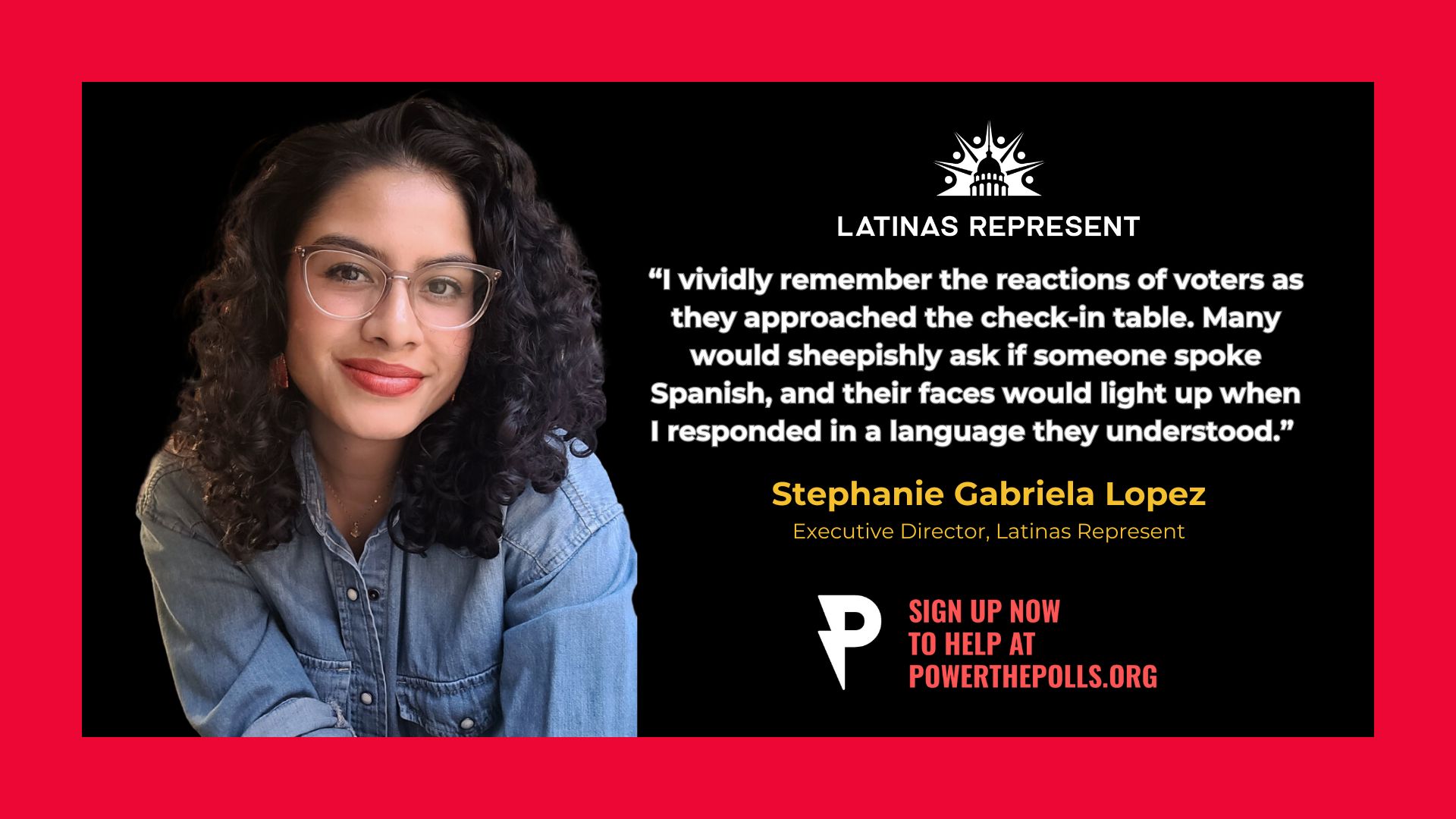
Training day arrived a few days before the election. Although I had accompanied my dad to the polls every election since I was a child, I had no idea what it would be like to serve as a poll worker. During the training, we were given a rundown of how to set up the polling station, greet voters, process votes, and operate the machines. I also met the other poll workers—some were newbies like me, and others had been doing this work for years. We were a team of retirees, veterans, teachers, students, union workers, and neighbors coming together to help voters navigate the election process. I was assigned to a predominantly Latine, bilingual voting precinct, and despite this, I was the only Spanish-speaking poll worker on my team. What began as a practical way to earn some extra money during college quickly evolved into something far more meaningful—not just for me, but for the voters I served.
Throughout that first election, I vividly remember the reactions of voters as they approached the check-in table. Many would sheepishly ask if someone spoke Spanish, and their faces would light up when I responded in a language they understood. Seeing them gain confidence and feel like they belonged at the polls was incredibly rewarding. It was clear that my presence made a difference, and these experiences left a lasting impression on me, which is why I continued to serve as a poll worker for the remainder of college.
It didn’t dawn on me at the time that my presence was part of a bigger movement toward more inclusive representation at the polls. The reality is that poll workers have historically been older and predominantly white—around 75% are over the age of 60. This lack of diversity can create barriers for voters from different racial and ethnic backgrounds, especially in communities where English may not be the primary language. Representation among poll workers is crucial because it helps ensure that all voters, regardless of background, feel comfortable and confident at the polls.
This is particularly important when we consider the growing voting power of the Latine community. This year, an estimated 36.2 million Latines are eligible to vote, making us the largest non-white voting bloc in the U.S. Yet, for this voting power to be fully realized, we need more Latines, involved at every level of the electoral process, including as poll workers. Our presence ensures that our communities can navigate the voting process effectively and that their votes are protected.
Serving as a poll worker taught me valuable lessons about our democracy and the importance of representation at all levels of civic engagement. My experiences as a poll worker continue to inspire my work today,which is why I am proud and excited for Latinas Represent to partner with Power to the Polls this year to mobilize more Latinas to serve their communities as poll workers. Join us by signing up to be a poll worker and sharing this information with your communities. Together, we can build a future where everyone’s voice is heard, and every vote counts.
We aim to track Latina elected officials at all levels of government. If you are a current elected official who identifies as Latina and are not currently listed on our map, please submit your information below. Your submission will be reviewed prior to being added to the map.
Source: National Hispanic Leadership Agenda
The word Hispanic is closely tied to the U.S. government and its efforts to identify groups of people, which defines it as “Americans of Spanish origin or descent.” Under this definition, Hispanic only refers to people who are originally from Spanish-speaking countries. This term includes people from Spain but excludes people from Brazil. Although this term is widely used to describe a pan-ethnic Spanish-speaking group of people, it is not universally embraced by the communities who have been labeled as such. Due to its connection to Spanish colonization, some view the term Hispanic as a Eurocentric label that erases the Indigenous and Afro-Latino heritage of people from Latin America.
The terms Latino, Latina, Latin@, Latine, and Latinx refer to a person or group of people of Latin American or Caribbean origin or descent; this includes people from all countries in Latin America and the Caribbean but excludes Spain. When used in the singular form, Latino refers specifically to a man or boy, which is why it is necessary to use the term Latina when referring to women or girls of Latin American origin. The term “Latino” applies to a broader group of people in Spanish because the language is gendered and the masculine forms of words may also be considered gender-neutral, which means that the language itself sets a baseline that is both heterosexual and masculine and by default exclusionary. The term “Latinx” arose out of a desire to have a gender-neutral term and is used to refer to people of Latin American or Caribbean origins and is inclusive of those who identify along a gender spectrum and diverse sexual orientations and gender identities. Latinx term began appearing on the Internet in queer communities in the United States; however, it is not always considered the perfect response to the search for a postcolonial word because it requires an understanding of the English language and tends to highlight people of mestizo identity while erasing Indigenous and Afro-Latino identities. Some also have used the term “Latin@” to be inclusive, using the @ symbol to represent both an O and an A. More recently, “Latine” has emerged as an alternative to Latinx as a gender-neutral term rooted in the Spanish language. It is starting to be used in some parts of Latin America and the Caribbean and is also starting to gain some recognition in the United States.
ngshgjhrjhtrhthhewthejhfjthejhjhtjhewthewthw